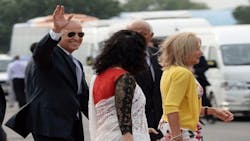NEW DELHI – U.S. Vice President Joe Biden arrived in India on Monday for a four-day visit designed to revive flagging diplomatic ties and fire up bilateral trade.
Biden, the first U.S. vice president to visit India in three decades, will meet senior leaders including Prime Minister Manmohan Singh in New Delhi on Tuesday before heading to the financial hub Mumbai to deliver a keynote speech on the economy.
In an interview published in the Times of India newspaper before his arrival, Biden said the world's two biggest democracies had a "tremendous capability to work together" but should be doing more.
He also emphazised that he wanted to see an acceleration in bilateral trade, which he said was on track to meet $100 billion this year.
"The United States has welcomed India's emergence and both nations have profited from it," the vice president said.
"India's rise as a global economic power is one of the most powerful stories of the 21st century."
Biden will fly on Wednesday to Mumbai where he is expected to hold a roundtable with business leaders and press for stronger intellectual property protection.
While trade has grown in recent years, there is still widespread frustration among U.S .business leaders over what they see as unfair trading practices. Among the points of contention is India's championing of generic drugs -- which advocates say save lives in poor nations -- despite protests from Western drug firms.
India in turn has been alarmed by proposals in the U.S. Congress to curb visas for high-tech workers.
Finance Minister P. Chidambaram and Commerce Minister Anand Sharma were both in Washington last week to pitch for investment and discuss India's readiness to open talks on a bilateral investment treaty.
The announcement of Biden's visit was made during a trip to India last month by Secretary of State John Kerry, who sought to allay Indian fears about the aftermath of next year's withdrawal of U.S. troops from Afghanistan. India, which has spent more than two billion dollars of aid in Afghanistan, fears a possible return to power by the Taliban, hard line Islamists who were strong allies of Pakistan before being toppled in 2001.
Talks between the U.S. and the Taliban were due to start last month after the Islamists opened an office in Doha, but they collapsed before even getting off the ground. In his meeting with Indian leaders, Biden is expected to reiterate that the U.S. will not support any peace process involving the Taliban unless they renounce violence.
"If the Taliban are to have any role in Afghanistan's political future, they will need to break ties with al-Qaeda, stop supporting violence and accept the Afghan constitution as part of the outcomes of any negotiated peace settlement," he told the Times of India.
"We strongly support the role India has played in Afghanistan, leveraging its economic strength to improve Afghanistan's economy... in projects that will help to ensure our common goal of a stable and prosperous future for the Afghan people," he added.
While the U.S .has been among the world powers calling for India to be given a permanent seat at the UN Security Council, observers detect a sense of drift in ties. "India is a natural ally of the U.S. but... relations require greasing occasionally because insecurities have crept in, especially on the Indian side," said Subhash Agrawal, of the Delhi-based think tank India Focus.
- Abhaya Srivastava, AFP
Copyright Agence France-Presse, 2013
About the Author
Agence France-Presse
Copyright Agence France-Presse, 2002-2025. AFP text, photos, graphics and logos shall not be reproduced, published, broadcast, rewritten for broadcast or publication or redistributed directly or indirectly in any medium. AFP shall not be held liable for any delays, inaccuracies, errors or omissions in any AFP content, or for any actions taken in consequence.
